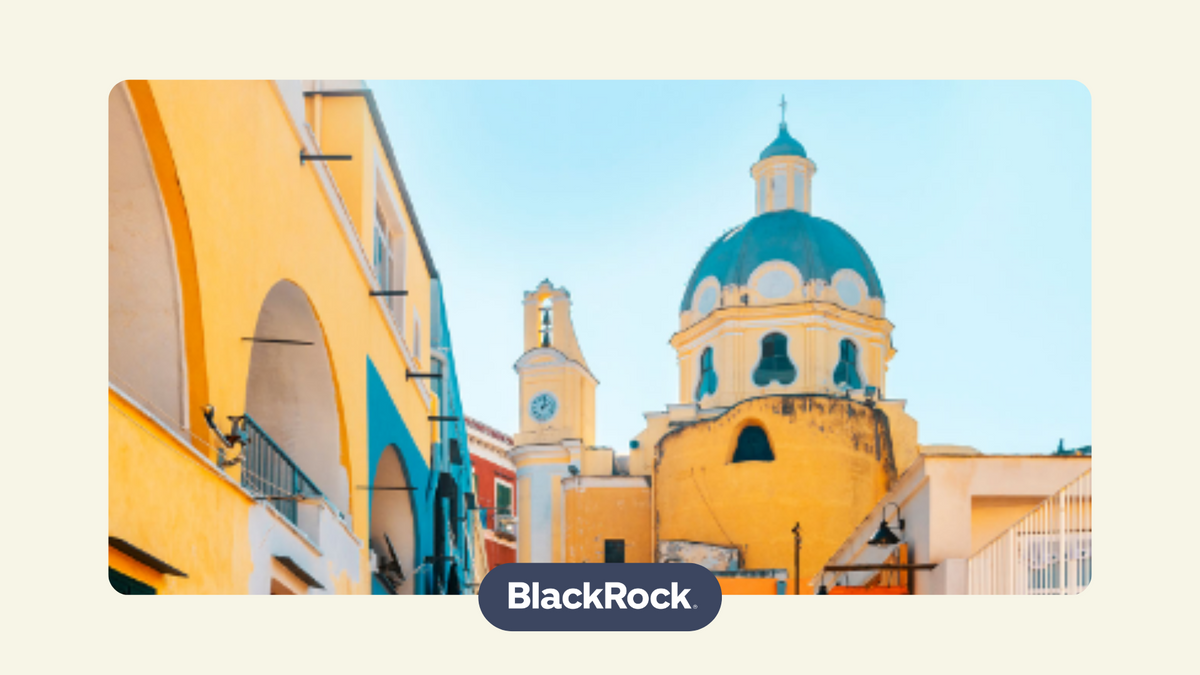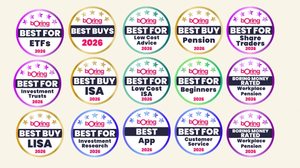Europe's luxury goods sector
13 Dec, 2023
Sponsored by BlackRock
European companies remain the world leaders in luxury goods. Despite some wobbles over the weakness of China and a weaker domestic consumer, these companies have remained remarkably resilient. Stefan Gries, manager of the BlackRock Greater Europe fund, asks whether they can maintain their strength in the face of weaker economic conditions.

Luxury goods companies are an increasingly important part of European markets. It is an area where Europe is dominant, accounting for around two-thirds of all sales of luxury products [1]. The sector has proved resilient in spite of rising interest rates, the weakness of China (an important market for luxury), and flagging global economic growth. However, 2024 may bring tougher economic conditions and greater challenges for the luxury market.
Europe’s luxury goods companies have grown considerably in recent years. Four of the top 10 largest companies in Europe are now in the luxury sector – LVMH, L’Oreal, Hermes and Dior (owned by LVMH) [2]. In April, LVMH became the first European company to surpass $500 billion in market value [3]. These luxury behemoths can command significant margins, with earnings amounting to nearly 25% of revenue [4]. This rivals the margins of the major technology companies.
Nevertheless, they face some challenges. Valuations have come down, but – like the goods they sell - many luxury goods companies still attract a premium price. This means earnings have to grow faster to justify their share prices. Yet economic conditions are becoming more difficult. China’s reopening has been weaker than expected, curbing an increasingly important source of growth for luxury good. The US and European consumers, also an important source of demand, are showing signs of weakness [5].
While we don’t see signs of a prolonged slowdown in spending, with saving and employment levels high and inflation falling, it remains a risk for the sector and will hit weaker names. We see a lot of dispersion in the sector, but believe the stronger luxury goods companies can transcend the economic climate and any slowdown in consumer demand. They have certain key characteristics that enable them to protect their margins and profitability, even as interest rates rise and the economy weakens.
The scarcity premium
Luxury goods companies deal in rarity. They have to ensure their products are ‘special’. Hermes, for example, deliberately maintains low stock, looking to grow its leather goods capacity by just 7% each year [6]. It focuses on the hiring and training of artisans in order to give them the necessary skills to produce their complex bags. As a result, it takes multiple years before a production facility is near full capacity. Growth is not reliant on volumes, and scarcity allows the company to push up prices.
It is a similar picture at Ferrari, where production capacity has been increased slowly and carefully. It is currently in the process of creating an ‘e-building’, where it will manufacture components for and assemble its future battery electric vehicles. As with Hermes, volume growth is only a small part of its revenue growth, with the company instead trying to drive revenues through its product mix and pricing.
Luxury goods companies also need to be looking at new markets. The Chinese market has become increasingly important. It now accounts for 35-40% of the personal luxury goods market, while the European and US markets together represent 40% [7]. This is why China’s lacklustre reopening has been painful. For companies to thrive in this environment, they need to seek out new markets to shore up demand. Hermes has been expanding into Asia and previously under-served parts of the Americas. Other luxury goods companies are looking to the Middle East as a source of new opportunities.
These companies also have to take good care of their brands. In this, scale matters. Larger companies have deeper pockets and can spend money on supporting their brand through advertising and marketing. This can create a virtuous circle and has seen some of the larger groups outpace their smaller peers.
Tracking the success or otherwise of individual brands has become considerably easier by using ‘big data’. At BlackRock, our data scientists can produce granular analysis of the performance of different brands, in different regions and among different consumers. This can be important in judging a brand’s resilience – for example, the wealthiest consumers are less affected by interest rate rises and economic conditions, but these can hurt affluent middle class consumers, so it is important to know where a company draws its revenues.
A report by US consultancy Bain & Co said it expects the sector to grow its revenues by 8-10% in the year ahead, and then sustain growth of 5-7% per year up to 2030 [8]. This is an attractive backdrop for luxury goods companies to sustain their profitability. However, not all companies will be resilient in the current environment. Companies need a number of key qualities – new markets, brand management and careful volume growth – to thrive. This is where we are focusing our attention.
Risk Warnings
Investors should refer to the prospectus or offering documentation for the funds full list of risks.
Capital at risk. The value of investments and the income from them can fall as well as rise and are not guaranteed. Investors may not get back the amount originally invested.
Past performance is not a reliable indicator of current or future results and should not be the sole factor of consideration when selecting a product or strategy.
Changes in the rates of exchange between currencies may cause the value of investments to diminish or increase. Fluctuation may be particularly marked in the case of a higher volatility fund and the value of an investment may fall suddenly and substantially. Levels and basis of taxation may change from time to time.
Trust Specific Risks
Counterparty Risk: The insolvency of any institutions providing services such as safekeeping of assets or acting as counterparty to derivatives or other instruments, may expose the Fund to financial loss.
Currency Risk: The Fund invests in other currencies. Changes in exchange rates will therefore affect the value of the investment.
Emerging Markets: Emerging markets are generally more sensitive to economic and political conditions than developed markets. Other factors include greater 'Liquidity Risk', restrictions on investment or transfer of assets and failed/delayed delivery of securities or payments to the Fund.
Gearing Risk: Investment strategies, such as borrowing, used by the Trust can result in even larger losses suffered when the value of the underlying investments fall.
Liquidity Risk: The Fund's investments may have low liquidity which often causes the value of these investments to be less predictable. In extreme cases, the Fund may not be able to realise the investment at the latest market price or at a price considered fair.
Important Information
In the UK this is issued by BlackRock Investment Management (UK) Limited, authorised and regulated by the Financial Conduct Authority. Registered office: 12 Throgmorton Avenue, London, EC2N 2DL. Tel: + 44 (0)20 7743 3000. Registered in England and Wales No. 02020394. For your protection telephone calls are usually recorded. Please refer to the Financial Conduct Authority website for a list of authorised activities conducted by BlackRock.
UK Investment Trust Funds: This document is marketing material. The Company is managed by BlackRock Fund Managers Limited (BFM) as the AIFM. BFM has delegated certain investment management and other ancillary services to BlackRock Investment Management (UK) Limited. The Company’s shares are traded on the London Stock Exchange and dealing may only be through a member of the Exchange. The Company will not invest more than 15% of its gross assets in other listed investment trusts. SEDOL™ is a trademark of the London Stock Exchange plc and is used under licence.
Net Asset Value (NAV) performance is not the same as share price performance, and shareholders may realise returns that are lower or higher than NAV performance.
The investment trusts [listed below/above/in this document] currently conduct their affairs so that their securities can be recommended by IFAs to ordinary retail investors in accordance with the Financial Conduct Authority’s rules in relation to nonmainstream investment products and intend to continue to do so for the foreseeable future. The securities are excluded from the Financial Conduct Authority’s restrictions which apply to non-mainstream investment products because they are securities issued by investment trusts. Investors should understand all characteristics of the funds objective before investing. For information on investor rights and how to raise complaints please go to https://www.blackrock.com/corporate/compliance/investor-right available in local language in registered jurisdictions.
BlackRock has not considered the suitability of this investment against your individual needs and risk tolerance. To ensure you understand whether our product is suitable, please read the fund specific risks in the Key Investor Document (KID) which gives more information about the risk profile of the investment. The KID and other documentation are available on the relevant product pages at www.blackrock.co.uk/its. We recommend you seek independent professional advice prior to investing.
Any research in this document has been procured and may have been acted on by BlackRock for its own purpose. The results of such research are being made available only incidentally. The views expressed do not constitute investment or any other advice and are subject to change. They do not necessarily reflect the views of any company in the BlackRock Group or any part thereof and no assurances are made as to their accuracy.
This document is for information purposes only and does not constitute an offer or invitation to anyone to invest in any BlackRock funds and has not been prepared in connection with any such offer.
© 2023 BlackRock, Inc. All Rights reserved. BLACKROCK, BLACKROCK SOLUTIONS and iSHARES are trademarks of BlackRock, Inc. or its subsidiaries in the United States and elsewhere. All other trademarks are those of their respective owners.
MKTGH1223E/S-3268382








